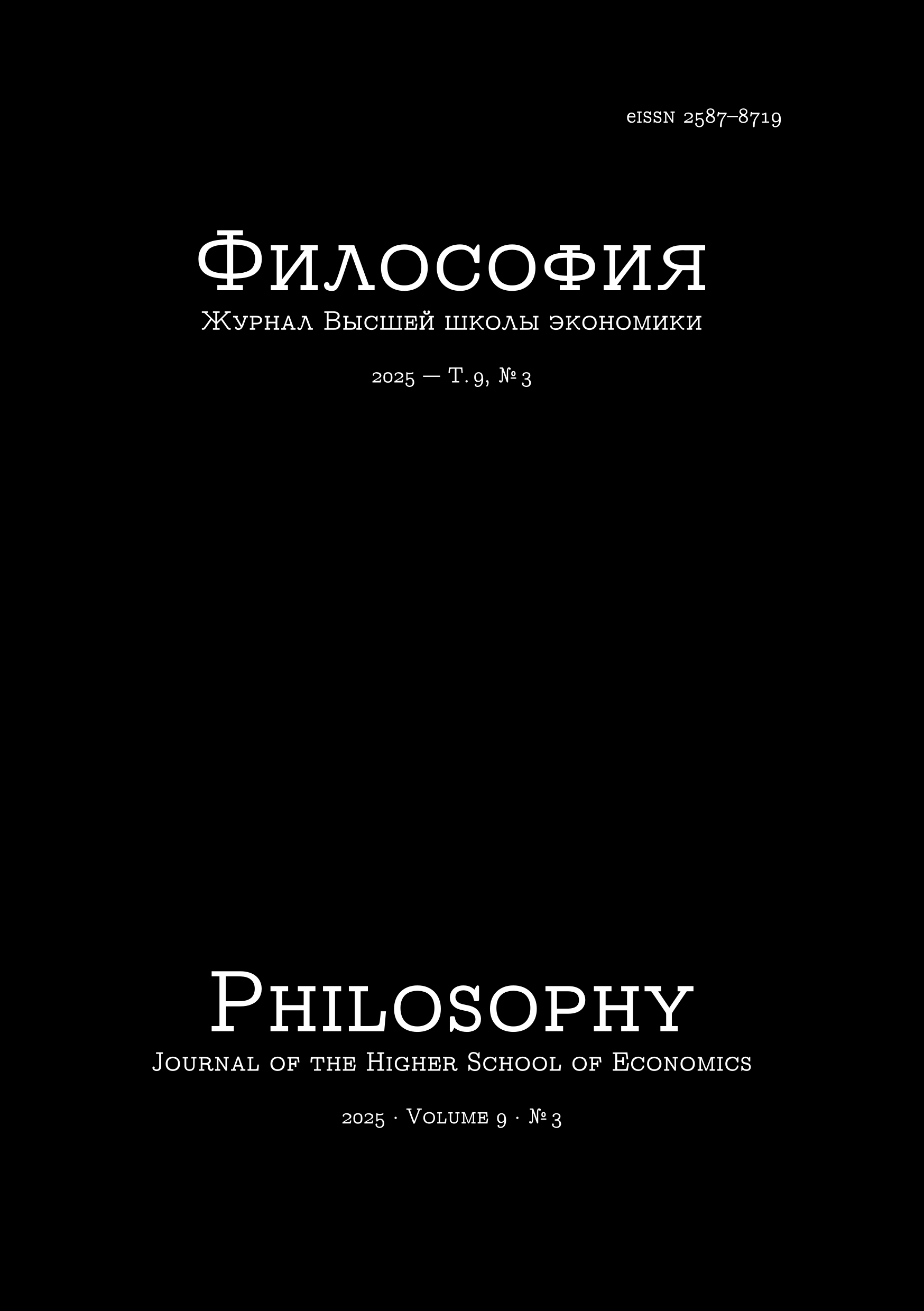Philosophy. Journal of the Higher School of Economics. Vol. 9 No 3
Abstract
Dear colleagues!
We are pleased to present the 3rd issue of the 9th volume of “Philosophy. Journal of the Higher School of Economics”. This issue features articles on logic, history of philosophy, and various fields of practical philosophy — not only (and perhaps not primarily) on philosophy of law and political philosophy, as was the case in the previous issue, but also on ethics, aesthetics, philosophy of science, philosophy of media, etc.
The issue opens with the “Logic and Philosophy” section. Zinaida Sokuler discusses the debates surrounding one of the most talked-about contemporary interpretations of the “Tractatus Logico-Philosophicus”. Antonina Kon’kova and Vladimir Markin attempt to explicate the propositions of the imaginary (non-Aristotelian) logic of Nikolai Vasiliev (1880–1940). I would like to emphasize that scholarly interest in the legacy of a figure like Vasiliev extends far beyond the confines of logic itself. Therefore, this text may be of interest to a broad philosophical audience. David Khizanishvili applies a cognitive approach to rational belief revision. The section concludes with an article by Georgy Filatov and Maksim Evstigneev, dedicated to the concept of philosophical analysis in the legacy of Ludwig Wittgenstein, Gilbert Ryle, and Peter Frederick Strawson.
The “History of Philosophy” section features two studies. Dmitry Fedchuk compares the approaches of Moses Maimonides and Thomas Aquinas to the theoretical apprehension of God by the intellect. Anna Platanova writes about how Nikolai Berdyaev, by critiquing Martin Heidegger, managed to formulate his own philosophy as existential. This article may contribute to discussions about whether we can consider Heidegger a representative of existential philosophy.
The “Practical Philosophy” section presents five studies. The section begins with an ambitious and, in a good sense, polemical article by Sophia Tikhonova and Lada Shipovalova. The authors postulate that digital technologies have reshaped social institutions and structures of knowledge production and distribution. As a result, in the authors’ view, mediality becomes a key characteristic of the current stage of science development. And since science performs the communicative functions of media, Sophia Tikhonova and Lada Shipovalova propose the new term “mediascience”. You can read about what it is in the article. I believe our readers will enjoy debating the given position. Elena Timoshina returns to the topic of the philosophy of law, which began in the 2nd issue of the 9th volume. The author examines one version of the rehabilitation of the common good, namely “common good constitutionalism”, and the debate surrounding this project. Mikhail Stepanov attempts to tackle a rather complex issue — he aims to contextualize contemporary republican theory. The complexity lies in the fact that republicanism as a contemporary theory is highly contradictory, and this is exactly what the author is grappling with. Ivan Snetkov explores the problem of the need to integrate moral values into the architecture of artificial intelligence systems. Finally, Maiia-Sofiia Zhumatina analyzes the paintings of Paul Cézanne, using Maurice Merleau-Ponty’s phenomenological teaching as the methodological framework.
In the “Publications and Translations” section, we continue publishing the translation of George Dalgarno’s treatise “The Art of Signs”. The publication of the fifth and sixth chapters of the treatise is preceded by an introductory note by Natalia Osminskaya, the editor of the translation. I am particularly pleased to note that this translation of the treatise has been carried out for several years now as part of a student-led initiative project. The translators and commentators for the fifth and sixth chapters were Emil Rakhmankulov, Renata Idrisova, and Ilya Onegin. In the “Reflections on a Book” section, Maria Marey reflects on the Russian translation (2025) of Carl Schmitt’s “The Tyranny of Values”. The “Academic Life” section provides a detailed overview of the already Sixth Bibikhin Readings, held at the Faculty of Humanities of the HSE University on June 27–28, 2025.
Thank you, dear readers, for your interest in the journal.
Alexander Pavlov
Downloads
Copyright (c) 2025 Philosophy Journal of the Higher School of Economics

This work is licensed under a Creative Commons Attribution-NonCommercial 4.0 International License.






